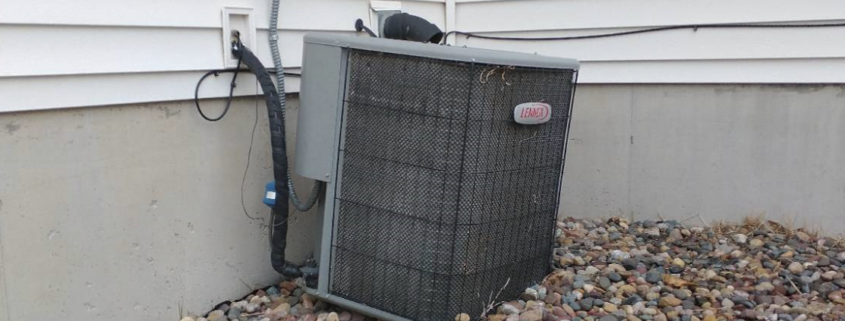Is your outdoor central air conditioner or heat pump level?
It’s important that your outdoor AC condenser unit is level.
Whether incorporated during the initial construction or added later by a local HVAC contractor, the outdoor AC condenser of your home should have been carefully leveled by the installer. Over time, as the ground surrounding your residence settles, the platform beneath your air conditioner may lose its level. For optimal performance, it is crucial that air conditioners and heat pumps are situated on even ground. If the ground beneath them shifts or tilts beyond a few degrees, the AC equipment may experience malfunctions or premature wear and tear.
Why Is a Level AC Unit Important?
When an air conditioner condenser is not level, it stresses the unit. The fan motor, operating at high speeds, can be damaged.
A level unit allows smooth flow of refrigerant and oil through the tubing, ensuring proper lubrication. An unlevel unit traps oil and refrigerant, hindering lubrication and risking uneven liquid release into the compressor.
Uneven ground causes excessive vibrations, stressing every component and leading to premature failure.
The condenser’s heavy components, including the copper coil, can cause sinking or tipping if the unit is not level, risking damage to the coolant line.
An unlevel condenser hinders proper pump operation, separating oil from the coolant and causing premature failure. Keeping the unit level ensures smooth condenser oil movement and prevents issues.
How to Check if Your AC Unit is Level
Start by visually inspecting the air conditioner. Examine the concrete pad in front of the unit – is it solid or does it show signs of sloping and cracking? For units with legs, inspect for rust and bends, ensuring they are stable. Look for any noticeable leaning or tilting of the entire unit.
To check if the AC equipment is level, use a level tool. Affordable carpenter’s bubble levels are available at local big box stores. A slight deviation from level is acceptable, but excessive tilt can lead to issues. The bubble on the level tool should ideally be within the guides. Verify the level in both directions on the top of the unit, and if applicable, check the level on any vertical sides. Confirming from multiple points ensures the unit is truly level.
Leveling Your AC Condenser should be left to the pros.
I strongly advise against attempting to level the outdoor unit yourself. Doing so poses the risk of bending coolant lines, leading to leaks and the release of refrigerant into the atmosphere. Even a minor kink in the copper tubing can result in significant issues for your AC equipment.
Leveling is a complex process that varies based on factors such as soil content, quality, degree of tilt, and the cause of the tilt. It may involve temporarily lifting the unit and replacing the concrete pad after leveling the soil beneath it. For a proper solution, professional assistance is recommended.




As someone concerned about the efficiency and longevity of my HVAC system, I’m grateful for the guidance provided here. It’s certainly a reminder to pay attention to the often overlooked aspects of home maintenance. Much appreciated!
This article clearly explains why a level AC unit is crucial. It highlights the risks of an unlevel unit (damage, malfunction) and offers simple tips for checking the level with a bubble level. Great info for homeowners! Thanks for your valuable information.
This is super helpful for homeowners trying to avoid expensive HVAC repairs. Regular maintenance really is the key to keeping costs down. What’s the most common issue you see with older heat pumps, and is it usually worth repairing over replacing?
Keeping your outdoor central air conditioner or heat pump level is crucial for proper operation. An uneven unit can strain components, reduce efficiency, and lead to premature wear. Regularly check the unit’s base and adjust as needed to prevent refrigerant imbalances and ensure optimal performance.
This article offers crucial insights into the importance of keeping an AC condenser unit level. A tilted unit can lead to inefficiencies, component wear, and potential damage. The detailed guidance on checking for imbalance and the recommendation to seek professional help are especially helpful. Thanks for sharing these valuable maintenance tips!